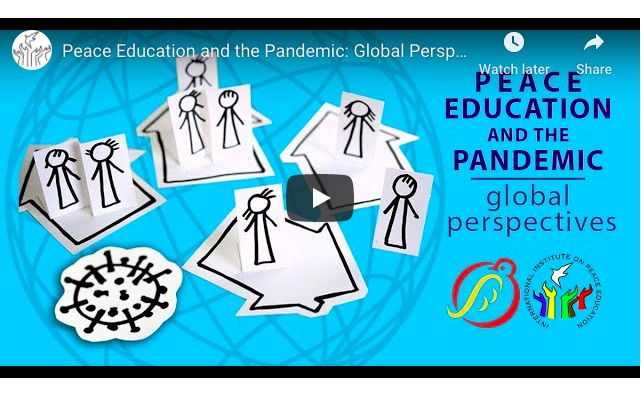… EDUCATION FOR PEACE …
An article from the Global Campaign for Peace Education
On April 13, 2020, the International Institute on Peace Education and Global Campaign for Peace Education hosted a zoom webinar on “Peace Education and the Pandemic: Global Perspectives.” More than 550 people from 72 different countries registered for the event, which was also live-streamed on Facebook. A dozen acclaimed peace educators from around the world shared unique perspectives on the systemic violence and injustices COVID-19 has revealed and how they are using peace education to respond to these and other critical issues. [Editor’s note: The dozen educators came from USA, Austria, Puerto Rico, South Africa, China, Nigeria, Philippines, Mexico, Colombia, Argentina and South Korea. A list with their bios, and topics can be found here].
 Video of Webinar
Video of Webinar(Continued in right column)
How can we work together to overcome this medical and economic crisis?
(Continued from left column)
The webinar explored two broad agendas. First, it presented an opportunity to hear how peace educators around the world are responding in the moment. How are peace educators facilitating the much-needed learning required for self-care, resilience, and adaptation to a changing reality? How are we adapting pedagogically to online learning spaces such as zoom (and what new social injustices have these rapid transitions revealed related to educational inequity)? How are we keeping safe physical distance while maintaining social connections? How are we navigating the trauma, anxiety, and fear caused by a pandemic that exposes our somatic vulnerability, as well as the vulnerability of our social, political and economic systems?
The webinar also presented an opportunity to collectively rethink urgent future agendas for peace education. This global pandemic has brought into sharp focus many of the concerns, possibilities, and challenges that peace education has been pursuing for decades. Presenters shared critical perspectives and developed clear connections between COVID-19 and “other pandemics” including war, poverty, patriarchy, and nationalism. All presenters explored the role of peace education in addressing these issues. Most importantly, most addressed how peace education might prepare citizens with the knowledge, capacities, and skills to envision, design, a build preferred social, political, and economic systems.